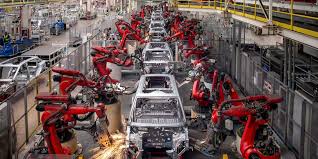Listen To This Post
Thenewsdose.com / Knowledge Desk
Delhi/Chandigarh,July 29,UPDATED:10.10PM
A full revival of Europe’s struggling automotive industry hinges on its commitment to end sales of carbon-emitting vehicles by 2035, according to a new study by Brussels-based campaign group Transport & Environment (T&E). The report, published Tuesday, warns that backtracking on the 2035 target could cost the continent 1 million jobs and unravel critical investments in battery manufacturing — potentially shrinking the sector’s economic value by €90 billion ($105.5 billion USD) by 2035.
Two Futures: Clean Comeback or Industrial Collapse
The T&E report presents a stark contrast between two possible futures for the European car industry. In one scenario, a strong policy-backed shift to electric vehicle (EV) production could restore the industry to pre-2008 financial crisis output levels of 16.8 million vehicles annually. The other scenario — a delay or dilution of the zero-emission mandate — could result in widespread job losses across the automotive supply chain and force companies to scale back or abandon battery investment plans.
“If Europe sticks to its 2035 phase-out of polluting cars and backs it with an industrial policy to support electric vehicle production, the sector could bounce back,” said Julia Poliscanova, Senior Director for Vehicles & E-mobility Supply Chains at T&E.
But if the EU falters amid political or economic pushback, the consequences could be severe: two-thirds of planned battery investments could vanish, and more than a million workers across vehicle assembly, component manufacturing, and related industries could be left behind.
EV Shift: A Net Job Creator — If Managed Well
Despite fears of displacement in traditional manufacturing, the report argues that the transition to electric mobility could result in a net employment gain. With targeted industrial policies, Europe could create over 100,000 jobs in battery production by 2030. 120,000 jobs in EV charging infrastructure by 2035. Together, these roles could more than offset job losses in the internal combustion engine (ICE) ecosystem. But the shift requires proactive policy action — including subsidies for domestic EV production, workforce retraining, and rapid expansion of the charging network.
The T&E study also estimates that a successful transition could boost the automotive value chain’s contribution to the EU economy by 11% by 2035, reinforcing the sector’s long-term industrial strength.
Industry Headwinds: Tariffs, Competition, and Lobbying
Europe’s auto industry, a historic pillar of the region’s economy, is currently navigating a tough external environment — from rising input costs and global supply chain constraints to intensifying competition from China and the U.S. in the EV segment.
Adding to the uncertainty is the reintroduction of 25% tariffs on car imports by U.S. President Donald Trump, which has already forced several automakers to revise production forecasts for 2025 and rethink export strategies.
Meanwhile, industry lobbying has led to some softening of EU CO₂ emissions regulations. In May, the European Parliament adopted amendments to existing rules, though the 2035 ban on new fossil-fuel vehicles remains intact — for now.
A Make-or-Break Moment for Europe
The report frames 2025–2035 as a critical decade for Europe’s industrial future. The global race to dominate electric mobility — from EVs to battery supply chains and charging infrastructure — is accelerating rapidly, and Europe risks falling behind unless it commits decisively to the clean energy transition.
“This is a make-or-break moment for Europe’s automotive industry,” said Poliscanova. “The competition is fierce, and delay will be costly.”
T&E’s analysis echoes broader warnings that without a bold industrial strategy tied to environmental goals, Europe could lose not just jobs, but its competitive edge in one of the world’s most strategic sectors.















